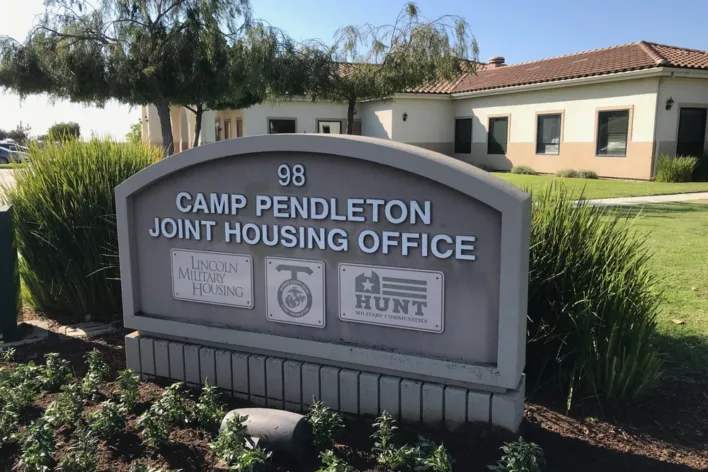Lawmakers: DoD Needs Progress On Military Housing Reforms

Military housing benefits are an important part of the compensation troops and their families are offered in exchange for the sacrifices made through military service. But how is this benefit eroded when those benefits require people to live in substandard, poorly maintained, and even dangerous housing?
In 2023, lawmakers pressed the Department of Defense to learn why military housing reforms aren’t going far enough, or fast enough.
And a 2023 GAO report says not all the military housing providers the DoD has partnered with to administer on-base military housing have agreed to reforms required by Congress.
For years, substandard, unsafe, unhealthy military housing has plagued those forced to consider living on base; contaminated drinking water at Camp Lejeune is the most infamous example, but there are plenty of others.
Military Housing Scandals: Balfour Beatty Communities
Balfour Beatty Communities is a national company that administers military housing in public/private agreements with military bases. The official site for the company describes Balfour Beatty Communities as “one of the nation’s largest providers of military family housing” at some 55 military bases.
According to an article published in 2022, Balfour Beatty Communities pleaded guilty in federal district court for “defrauding the armed forces by falsifying housing repair records from 2013 to 2019 in order to receive higher performance awards.”
Exceptionally Proud?
That comes despite a statement the company makes on the landing page of its official site, which states, “We are exceptionally proud of the important work we do for military families through delivering new construction housing, significant renovations and refurbishments to existing housing, as well as more responsive property management and maintenance support.”
The RollCall.com report notes that Balfour Beatty Communities paid $65 million in fines and restitution.”
This is a serious issue for military families, and some lawmakers seem to agree that housing reform isn’t going far enough or fast enough. Military housing is meant to benefit troops, not a liability.
Military Housing Scandals: Camp Pendleton
In 2020, Stars and Stripes reported “Another military family in the San Diego area has filed a lawsuit against Lincoln Military Housing, complaining of mold-infested housing that was not properly addressed and caused ongoing illnesses” at Camp Pendleton in California.
Stripes.com adds there are “at least nine ongoing cases against the military housing management company in San Diego Superior Court, according to the court’s online database” when the article was written.
At issue in this particular case? According to Stripes.com, the trouble started when a military family moved into base housing there and found “a number of sanitation issues and health hazards on the leased property, including dirt and animal hair imbedded [sic] in the floor, dog feces inside the house, a maggot infestation underneath the house and mold visible in the closets and within the windowsills…”
Lawmakers Demand Answers
In July 2023, Military.com reported three lawmakers writing to the Pentagon demanding to know why reforms aren’t being implemented as ordered in a timely manner.
“Sens. Mark Warner and Tim Kaine, both Democrats of Virginia, pushed for answers on how officials plan to respond to shortcomings identified in an April report from the Government Accountability Office (GAO) on the military’s oversight of its privatized housing.”
GAO Report Findings On Military Housing Reform
Why did they reach out to the GAO? In April 2023, the Government Accounting Office released a report on military housing, including some concerning data points.
Among them? Housing reforms are not consistently applied across the DoD, the guidance offered by the DoD is unclear and lacks direction, and there is no training or guidance (at the time of the report in April 2023) for those who must help base residents resolve issues related to inadequate military housing.
Congressional Requirements Unheeded?
Congress requires military housing providers to create an 18-point tenant bill of rights. It’s a move that seems fairly reasonable considering the DoD’s track record with military housing.
But according to the GAO report, as of April 2023, “11 of the 14 private housing companies have voluntarily agreed to fully implement all 18 rights, and the remaining three have voluntarily agreed to implement 16 of the 18 rights.”
For some, the question is simple. Why are these private housing companies allowed to even consider picking and choosing which of the 18 congressionally required rights they prefer to implement?
The GAO report also notes that while each branch of military service has committed to inspections of homes military members may be required to live in on-post, the GAO notes the Pentagon “has not developed clear or consistent inspection standards and the military departments have not provided adequate inspector training.”
Future Reforms
Most news stories have a beginning, a middle, and an end. But the military housing scandal does not end until the reforms are in place, the shoddy housing and unsafe living conditions (including black mold and other hazards) have been eliminated for all troops, not just those who make enough noise to have their complaints heard by the media, the courts, or Congress.
This story is far from over, but some lawmakers hope to use the power of the National Defense Authorization Act to address military housing reforms in more substantive ways.
Negotiations for each year’s defense spending budget typically include haggling over defense projects like housing reform, but going forward this issue is more critical than ever and should not be viewed as a business-as-usual topic of discussion where more funding and reforms are concerned.
Related: The PACT Act and Your VA Benefits
About the author
Editor-in-Chief Joe Wallace is a 13-year veteran of the United States Air Force and a former reporter/editor for Air Force Television News and the Pentagon Channel. His freelance work includes contract work for Motorola, VALoans.com, and Credit Karma. He is co-founder of Dim Art House in Springfield, Illinois, and spends his non-writing time as an abstract painter, independent publisher, and occasional filmmaker.


